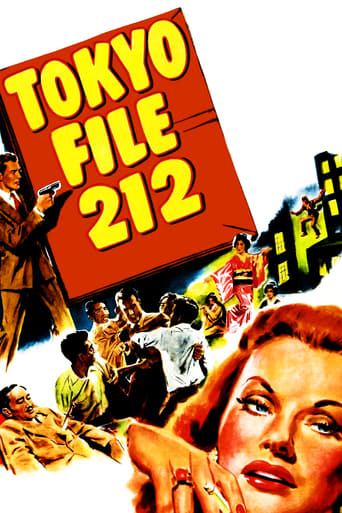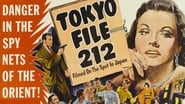MartinHafer
There's no doubt about it--"Tokyo File 212" is a terrible movie. The acting is often terrible (by a cast of mostly unknowns), the writing and dialog silly and the plot is also rather silly. Yet, it's still worth seeing because the film is an interesting look into the Cold War.The film is set in Japan during the Korean War and was made with the cooperation of the Japanese and American governments. What it appears to be is a film that is trying to cement positive relations between the two countries since they were partnered against communism and it was made during the Korean War (and Japan was a staging point for the UN's forces aiding South Korea).The film concerns an American reporter who works as an undercover agent. His job is to locate an old college friend---one who is Japanese and is working for the commies. Through much of the film, the American is assisted by a woman who looks a lot like Natasha from "The Adventures of Rocky & Bullwinkle"! Eventually, they are able to get the old friend to see the goodness of democracy and the find ends on a very explosive note.The bottom line is that although the film has a few exciting scenes, many of the actors had great difficulty reciting their lines and the film came off as super-duper cheap. You'd think with the US and Japanese government behind it, the film would have been a lot better! Instead, it looks a lot like a film created by some government hacks with little input from film professionals. Laughably bad at times--but an interesting look into the Cold War and the sort of films that were produced during the height of this tense period.
ZenVortex
Although not classic film noir, this is an entertaining little B movie filmed in Tokyo during the Korean war. Robert Peyton ("B" version of Fred McMurray) delivers a generally adequate performance as an undercover army intelligence officer investigating a Japanese spy ring that is sabotaging US operations in Korea.More interesting is the alluring Florence Marly ("B" version of Marlene Dietrich). The Czechoslovakian-born Marly is portrayed as an Eurasian femme fatale who speaks English with a cute Japanese accent. Of course, she is completely untrustworthy and leads Frederick into the sordid Japanese underworld on a mission to locate a college friend who has been tricked into working for the communists.The plot twists and turns with some interesting noirish street scenes and good performances by Japanese actors. Not a great movie but worth watching for Marly's intriguing performance and the surprise ending.
PolitiCom
A B-Movie must. The lousy dialogue is compensated for by the fact that a lot of key scenes are in Japanese - without subtitles.Filmed entirely on location, it provides some interesting shots of post WWII Japan and the cast includes real soldiers who were part of the American occupation force. Francis Marly is great as a broadly sketched femme fatale. A trivia buff's footnote: the producer was famous San Francisco attorney Melvin Bell
toof
The cliches come thick and fast with this story of cops and gangsters in post war occupied Japan. American intelligence officer posing as journalist comes to Japan to find an old college classmate, Taro, who's mixed up with a crime syndicate involved in about every 1950's evil including labor agitation and spying for the North Koreans. Taro, who just missed becoming a Kamekaze pilot before the war ended, finally turns to help the police after his own band of thugs attack his ex-fiancee and father. Predictable and cheap film noir. Beautiful and dangerous dame with strange accent, villains hiding in the shadows, blah blah blah. Two things make it worth watching: the pace is quick and the location shots and re-creation of Japanese setting are remarkably good. Tokyo looks beautiful and mysterious. Many shots of street markets and public gardens. The scene in the Japanese-only bar complete with drunken tattooed men and hula dancers is a 1950's masterpiece of the ultimate den of iniquity.




